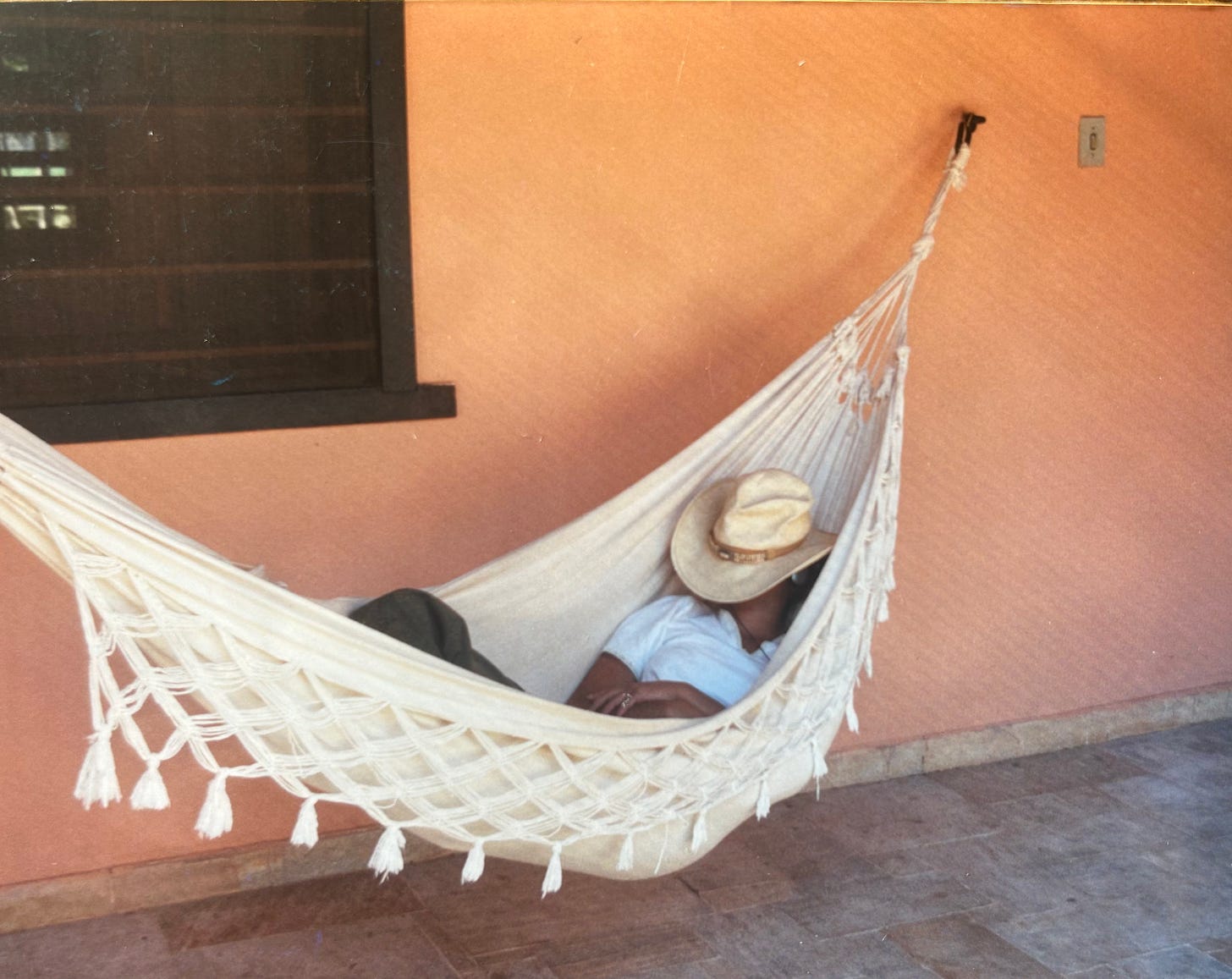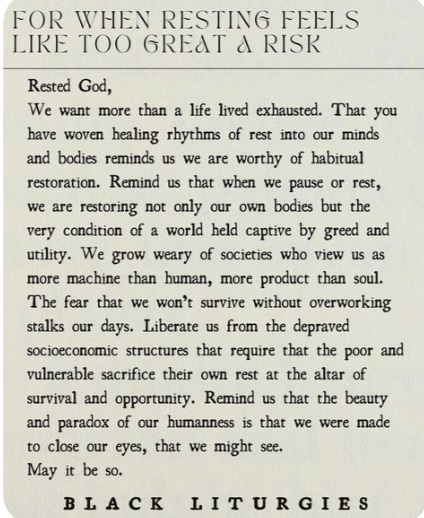Photo: Amber napping in Brazil in the early 2000’s in a white fringed hammock with a cowgirl hat over her face. There is a shuttered window, peach-colored wall, and gray tiled floor in background.
When I was stressed out as a teenager, I would catch myself holding my breath. It was a reflex I never thought much of at the time. For some of us, it seems when we need our breath the most, it's the first thing we forget.
A few decades later, a friend recommended Breath by James Nestor. The book is part experiment, part lesson— a stark revelation of how our bodies deteriorate when we don’t breathe properly and the strength we reclaim when we do. Nestor’s words struck me, and I committed to breathing better, to breathing period. Yet even with countless books and spiritual teachings urging us to anchor each moment to our breath, how does something so fundamental continue to feel elusive?
Reading Breath made me aware of how stress regularly pulls me out of my body, leaving me short of breath. The ability to take a deep breath, to experience the simple satisfaction of a sigh, felt impossible. The pandemic, global capitalism, racial violence— all of it felt like a never-ending spiral, leaving me breathless. Moments to pause and simply be felt increasingly rare.
But as Leslie Avant Brown and the Blooming Willow coaching team taught us in the journey to becoming Healing-Centered Coaches, a pause is a portal to renewed possibilities. A pause can take many forms: a dance break, a nap, a poem, or a snack. Regardless of its form, each pause helps reset our minds and bodies, restoring a sense of balance and grounding us for whatever comes next (see also here).
Relearning how to breathe has taken years. And still, especially lately, I feel that craving for the kind of breath that reaches the very bottom of my diaphragm, the kind that releases and restores. It’s through breath that our bodies access calm. In times as turbulent as these, our breath is a portal to the rest we desperately need to sustain ourselves.
Rest is no longer an indulgence. It’s a necessity. We are exhausted, grappling with ceaseless violence, systemic racism, unchecked capitalism, patriarchy, and a climate in crisis. We're not rejecting grind culture out of petty rebellion; we're doing it because, when pushed to the limit, our instinct is to prioritize survival. We’re realizing rest is essential, and no longer (or ever should be?) something to be “earned.” As Oliver Burkeman reminds us, we’ll never reach that magical, problem-free day when our to-do lists are done and our worries are gone. We are tricked into thinking that our productivity is the measure of our worth, but there’s a hole in the bucket. The more productive we are, the more productive we feel we need to be. Phew so many of us have been there too many times. The truth is, despite living in a society where our livelihoods depend on our work, we are inherently worthy. Period.
There’s a powerful invitation here, and I’m grateful for the rest revolution led by visionary Black women— Tricia Hersey, Octavia Raheem, Cole Arthur Riley, and so many others—who are reclaiming rest as an act of resistance. It’s not an indulgent luxury; it’s a radical commitment to our liberation from systems that commodify our humanity. It’s no accident that Black women are leading this revolution. We are the ones most at risk of being ground down by this machine. Black women’s health outcomes and workplace experiences reflect a type of intersectional violence that has exploited our bodies and labor for capitalist and white supremacist gain. When Black women reclaim rest, we are re-writing a centuries-old lie that our spirit belongs to anyone but ourselves, and our relationship to the divine.
There is an immense amount of trust in rest— trust that all will be okay if we take a break. Trust in our bodies to restore and our brains to reprogram the lie that unceasing work will liberate us one day. We must relearn that there is value in the pause -- that act of faith it takes to jump off a moving train so that we may be still.
A trust in the possibility of restoration must be central to our leadership moving forward. Restorative leadership, as Ain Bailey describes, “creates the conditions for time, space, reflection, and comprehensive restoration. This approach takes us beyond scarcity and control into a future defined by abundance and collective generosity—an essential shift for the well-being of all communities.” We need spaces like New Seneca Village, Fellowship for Liberated Futures, and The Highland Project to guide us there. We need spaces like the Embodiment Institute to help us remember what it feels like to be grounded in our bodies. We need to remind ourselves there are at least seven types of rest at our disposal every day, and choose one today.
These reflections are as much a note to self as it is to others. I am actively disentangling myself from the pressure to live in a state of doing, and re-learn the power of being. Those who know me are familiar with a pattern of pushing myself to my limits far too often. Rest is not something I have even come close to mastering, but it is something my soul seeks. I invite others to share what they are learning about rest for themselves as well. This is a story we re-write together.
On the eve of a critical election, let’s remember our breath. Let us remember that the reason we are all exhausted is because this shit is exhausting. Let us remind each other that the risk of not resting, may be greater than the risk of leaving a task undone. May we trust in rest to carry us through.
Source: Cole Arthur Riley, October 2023






Beautiful!
Beautifully written and rich with depth, wisdom and clarity. Sacred Holy Rest! Resting amidst unrest....The medicine of our breath. Ahhhhhhhh.....YESSSSSSSSSS! Thank you for reminding us to pause, breathe, remember! Amore, G